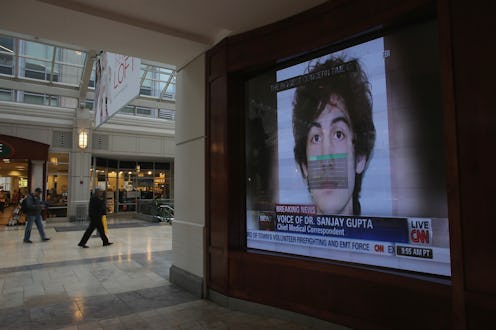News
Will Dzhokhar Tsarnaev's Trial Be Moved?
On Thursday, defense attorneys in the case of the suspected 2013 Boston Marathon bomber filed papers requesting that Dzhokhar Tsarnaev's trial be moved outside of the city to a new location, citing an already prejudiced jury as their reason for relocation. The 21-year-old Tsarnaev faces 30 separate charges in connection with his alleged involvement of the Boston Marathon bombing on April 15, 2013. Jury selection for the case has been underway now for more than two weeks, although some are doubtful that the court will be able to select a location with any impartial potential jurors due to the viral media coverage of the 2013 events.
In its request, the defense claims that "fully 68 percent of prospective jurors already believe that Mr. Tsarnaev is guilty, before hearing a single witness or examining a shred of evidence at trial," according to court papers.
Wrote Tsarnaev's attorneys in their appeal:
Simply put, the presumption of prejudice precludes both actual and apparent impartiality and undermines public confidence in the proceedings. The presumption cannot be overcome or cured. If this case does not warrant a change of venue, the entire body of law on venue as it relates to the Constitutional rights to due process and a fair trial will be left a hollow shell.’
U.S. District Court Judge George A. O’Toole Jr. has previously struck down two requests from the defense to move the trial outside of the Boston area, insisting that with proper screening (in the form of long-winded questionnaires) adequate jury selection could still be possible. The defense's latest appeal comes on the heels of the announcement that opening statements, originally scheduled for Monday, Jan. 26, would be delayed.
"It is not possible yet to specifically target a new start date," said a spokeswoman from the U.S. District Court for the District of Massachusetts in a statement Thursday morning.
Tsarnaev's attorneys certainly have their work cut out for them: in today's social media age, where information is distributed to the masses in minutes (if not seconds), is it even possible for court officials to offer up a jury selection that hasn't already formed an opinion on a specific topic?
A few prospective jurors pointed out that with all of the attention paid to the event in question, whether by national news outlets or social media users, it would be nearly impossible to keep an open mind; in their questionnaires, several potential jurors in the Tsarnaev case didn't just hint at an open bias — they stated it outright:
"For this case I think a public execution would be appropriate, preferably by bomb at the finish line of the marathon."
"We all know he’s guilty so quit wasting everybody’s time with a jury and string him up."
"I have close friends that work the emergency room at [Massachusetts General Hospital] ... My friends still have nightmares of that day!"
On the morning of the Boston Marathon bombing alone, 3.7 million people sent out nearly 8 million related tweets within hours of the explosions, some of which were factually incorrect, including the false rumor that missing Brown student Sunil Tripathi was one of the suspects behind the attack (Tripathi was later found dead near Providence, R.I. in unrelated circumstances, prompting a backlash on Reddit against the rushed coverage).
In recent years, a growing number of events have managed to capture the rapt attention of the social media sphere and subsequently shone a glaring spotlight on topics which otherwise may have been glossed over by traditional media: on the evening of Monday, Nov. 24, 2014, there were over 3.5 million tweets sent out mentioning the Ferguson grand jury verdict in the case of Officer Darren Wilson, the Missouri police officer who shot and killed 18-year-old Michael Brown. In the week preceding former Egyptian President Hosni Mubarak's resignation on Feb. 11, 2011, the number of tweets regarding political and social unrest and the Egyptian Revolution jumped from 2,300 per day to over 230,000 per day.
The notion of a totally unbiased jury is on its way to becoming an impossible one. With roughly 64 percent of the American adult population on social media, according to a study by the Pew Research Center, we're blossoming into a more in-tune society — but the idea of impartiality may be dead. With the world at our fingertips, there seemingly isn't room for it.
While defense attorneys in the case of alleged bomber Dzhokhar Tsarnaev are still well within their rights requesting a new set of potential jurors, a clean slate may simply be out of reach.
Images: Michael Hayes/Twitter, Twitter Data/Twitter, Getty Images (2)
